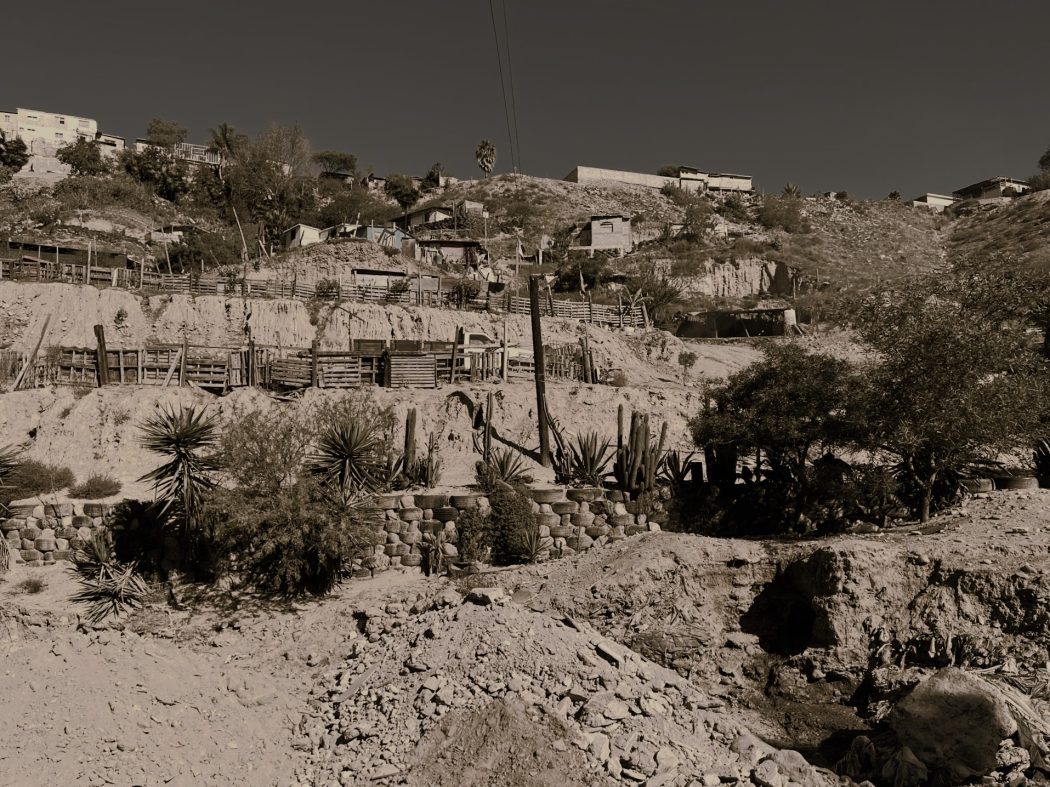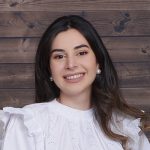Tucked away in a shadowed corner between the truncated stairs to the church stage and the endless rows of stacked chairs, a man sits crouched, holding a child between his legs as if she is one of the last wonders of the world. Without looking for them, they would be completely missed. The church, a glorified warehouse at best, is bustling with sound — whether from the jubilant screams of children as they swarm across the muddy floors or the echo of adults as they mirror the same infectious story to the doctors and medical students listening across plastic tables masquerading as patient rooms. You cannot hear the father’s coos as he smiles and speaks to his treasure nor feel the tenderness of the kisses he rains upon his daughter’s forehead. They are hidden in their own private sanctuary, this nook they’ve made out of pious steps.
Of all the gruesome scenes in Tijuana, this one remains imprinted on the forefront. There is a constant juxtaposition of the joyful ignorance of children amongst the anxious angst of their parents — between complete material destitution and the richness of spirit. In one minute, I play tic-tac-toe with a patient’s sibling, making sure to lose every time, and in the next, I am consoling his weeping mother as she looks at his younger sister, who is laboring with every breath, fighting for oxygen against a ruthless pneumonia.
“She most likely needs the hospital,” are the whispers spoken as if a bad rumor was being spread.
I look at Dr. Virgil in inquiry, “If she needs a hospital, why aren’t we sending her yet?” This was a scene I thought I had seen before while working in Puerto Penasco. Patients who were too sick or unstable to be treated by the clinic were immediately taken to better equipped facilities.
He glances in my direction before peering at the floor and murmuring, “the hospitals here don’t take migrants.”
It was like listening to a sound at its most irritating and painful frequency. High pitched ringing followed the echo of “don’t take migrants.” The child in front of me, gasping for air with the first case of intercostal retractions I had ever witnessed, did not look like a migrant. She looked like the sister to the little boy who beat me at tic-tac-toe. She looked like one of her mother’s weeping treasures. She looked like one of God’s purest gifts to this planet, a child. She had been degraded and dehumanized to a being undeserving of hospital care because her parents took her on a journey for a better life, perhaps to even save her life, and yet she could die despite these valiant efforts.
I look away from the little girl and start my own encounter with a new patient. It is another father and daughter, coming all the way from Brazil. I make a passing comment on whether he has been keeping up to date with Brazil’s performance in the World Cup, trying to find something to connect on. As the words left my mouth, I realized it was probably stupid to expect someone with no access to a TV and other things to worry about, such as his sick child, to care about the World Cup. He might have just humored me, but he smiled and said he had been told that Brazil had won their first game. His daughter stayed fast asleep in his arms, snot trails on her philtrum and tear tracks drying on her chubby cheeks, as I listened to her fluttering heart with the stethoscope. She had been vomiting up all she ate and was now losing weight. She had diarrhea, couldn’t sleep at night, and had a suspicious rash for the last 6 months along her torso and legs similar to other children who had crossed through similar countries. Thankfully, her physical exam was a bit more benign than the last child, but we were at a loss as to the cause of her symptoms and her chronic lesions. Without looking closely, I would have almost missed the constellated scabs across her chocolate tummy. There was nothing within our pharmacy that could definitively cure what was going on. At most, we could encourage dad to keep coaxing his baby to breastfeed with mom and give some ointment to alleviate the itching from the rash. It already felt like our medications were a stretch to call treatment. I nearly burst into tears of frustration when even the anti-itch cream became out of the question because we had prescribed all we had. I had nothing meaningful left to say, so I asked if he had any other children. I watched him cradle his baby closer to his chest, voice tinged with both worry and adoration as he spoke, “she is my only one.”
As it neared two in the afternoon, organizers of Refugee Health Alliance began to instruct us to turn patients away. We had to pack our things and head to another clinical site where an additional fifty patients or so had lined up to be seen since the early morning. This was part of our work that I did not enjoy. I had nothing but “lo siento” and “volveremos la próxima semana” to give to the few parents who still tried to get seen. My unease rested in the fact that I had no way to know if my words were true. I would not be there next week to make sure that they really would be seen.
After walking down the dilapidated dirt hill from the church, one of my dearest classmates, Jessmin Fernandez, plopped down on a slab on concrete next to me. There had been little time to eat, and we were famished. Despite feeling like I had a layer of influenza coating my body and scrubs, I was going to eat with my hands because there was nothing else to use. Jessmin and I had agreed to share our meal of baby carrots, hummus, salami, and cheese. All these simple treats tasted better than I remembered. While we sat on the ground, eating, and waiting for a taxi to take us to the next clinic site, I stared at a haphazard bridge made with two logs traversing a trench at least twenty feet deep. Earlier that day I saw a group of adults and children congregating on this plank, staring down with expressionless faces.
I remember turning to another classmate, Frank Cossio, and wondering out loud what could be the spectacle. As a professional for predicting worst case scenarios, I even thought about the possibility of a dead body lying in the ditch, the dirty stream water carrying trash and plastic over their chest to the mouth of the drain to the roadside. Just days before we had arrived in Tijuana, we were informed of torrential rainfall that had caused all the damages to the dirt road leading to the refugee site. This is why we needed to taxi and get there by foot, crossing newly made streams and cracked erosions on the way. And right as I felt another crunch of carrot between my incisors, I learned my suspicions were true. The police cars we had noticed earlier that day were there to take care of a fallen corpse. Jessmin and I had only silence to share. We scooted closer together, and I took another bite, this time with salami and cheese. Nearby we could hear the thrilled squealing of children jumping on squalor, pretending to bounce on a trampoline.
It was these images that I held close. The dichotomy of eating deli meats around starving stray dogs, walking the broken road leading to safe refuge, and balancing tragedy and resilience along a narrow tightrope. The emotions are too much to handle, the memories too raw to think of in the present. You are there for your patient, you disconnect, and go to the next. You must turn away those who cannot be seen. You must hope the nurse finds a needle to treat the child with pneumonia. You console the heartbroken parent. You go home to your steady, and relatively easier, life in the US. You think of how to handle this landslide of emotion and you write and write and write, looking to record this moment, to use it as fuel for the next time. Because of all the pity I could rain upon migrants, none of it would be helpful or desired. Instead, I try to remember the father by the church steps, holding the last wonder of the world, and I want to be worthy enough to protect her too.
Natalie Nabaty is a medical student from the class of 2025 at UACOMP with so many passions she struggles to juggle them all. Between playing guitar, dancing traditional Assyrian line dances, and studying global health, writing is a skill she is happy to refine while in medical school. She graduated from ASU with a Bachelors in Biology and a minor in Psychology. Her special interests include migrant health, global neurology, and medical humanism.


